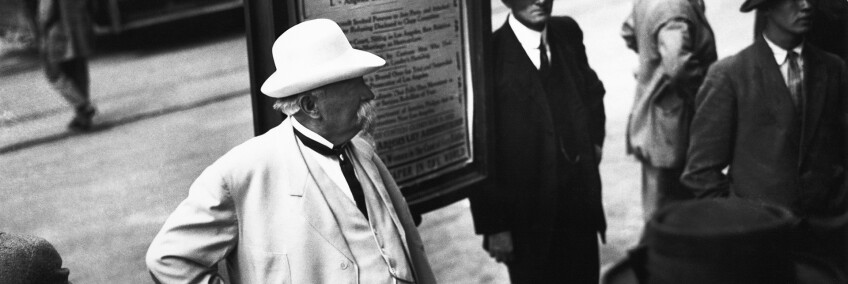Carey McWilliams: Challenging The Chandlers’ Los Angeles

This Op-Ed was originally published on pbs.org in 2009.

Journalist, lawyer, public intellectual, political activist, and historian, Carey McWilliams, described Harrison Gray Otis as a “belligerent, choleric, opinioned” man who “quickly developed the fixed idea that he owned Los Angeles, in fee simple, and that he alone was destined to lead it to greatness.”
McWilliams attributed such extravagant and self-aggrandizing thinking to historical events, namely the dramatic growth of the southern metropolis in the wake of large migrations from Mexico, Asia, and especially the midwestern and eastern United States in the early 20th century. Since Otis and a cohort of powerful, Anglo men “had not merely ‘grown up with’ a community,’ McWilliams reflected in his 1946 publication, "Southern California Country: An Island on the Land," they “had conjured that community into existence.”
Carey McWilliams (himself a transplant from Colorado) built a career in print, penning essays, articles, and books that complicated and contradicted such conjuring: the dreamlike image of California represented in the life of and heavily promoted by Otis and his son-in-law/successor, Harry Chandler.
McWilliams’s first contact with the world of journalism came in the credit department of the Los Angeles Times where he helped locate wayward advertisers. Such work shaped his sense of the city and evolving social criticism; “After all is there a better way to understand a community than to be exposed to the chicanery, fraud,desperation and hardship, and the very real tragedies that one encounters in this kind of business ‘underworld?” he exclaimed.
This early introduction into the deceptions and difficulties that defined Los Angeles informed his sharply observed commentaries of local race relations, labor conditions and labor organization, environmental change, and domestic politics delivered over five decades. He eloquently and passionately exposed the struggles of workers and ethnic minorities, the competition for scarce natural resources, and abuses of power by politicians and the business elite, hoping that his exposure of inequalities and injustices would prompt reform.
McWilliams offered a clear-eyed vision of Southern California that current scholars and journalists have embraced as they try to understand the region’s past.
As a tradition of investigation and representation in tension with, even opposition to that of the Otis/Chandler family, McWilliams’s work also speaks to the rich range of voices that have invented Los Angeles.
Sources:
"Fool’s Paradise: A Carey McWilliams Reader" (Berkeley: Heydey Book, 44, 45)
Excerpted in Peter Richardson, "American Prophet: The Life and Work of Carey McWilliams" Ann Arbor; University of Michigan Press, 2005
Top Image: Harrison Gray Otis, Founding Publisher of the Chandler Dynasty, centralized, militarized and gave clear strategic direction to the city’s elite. | Courtesy The Huntington Library




